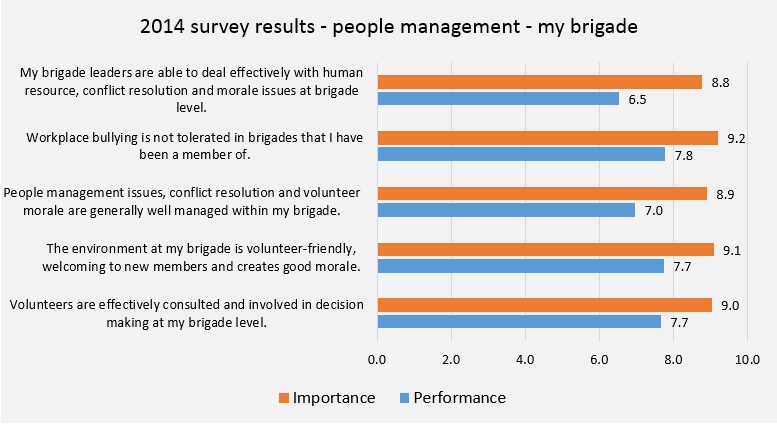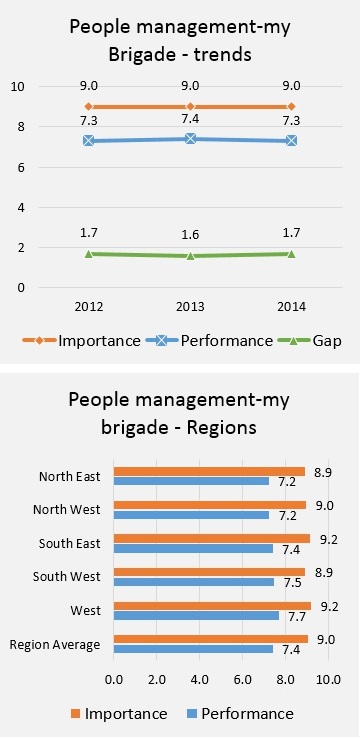

The 2014 survey scores for importance against specific statements in the ‘people management – my brigade’ theme scored equal highest against statement scores across the survey.
The statement “Workplace bullying is not tolerated in the brigades that I have been a member of” scored 9.2 for importance in the 2014 survey, consistent with the score of 9.3 received in 2013. The statement “the environment at my brigade is volunteer friendly, welcoming to new members and creates good morale” scored 9.1 for importance in the 2014 and 2013 surveys.
These scores are supported by written comments received from respondents that relate to their own brigades, with comments relating to a high level of importance amongst volunteers for a safe and welcoming brigade environment, free of bullying or other forms of harassment.
In the written comments, there is a common and substantial concern raised about bullying and harassment, and the poor level of response and support for resolving conflict when it does occur.
One interpretation of the spread and the tone of the commentary could be that when things are going well there is generally a high degree of satisfaction.
However, when there are problems in particular brigades or locations, these have a specific impact on the people involved and are generally not managed as well as they should be.
The comments are consistent with written survey responses to statement fourteen, suggesting that some brigades need more support in this area.
Comments also suggest that there are ‘cliques’, instances of ‘them and us’, ‘clubs’ and other cultural elements that negatively impact on volunteers generally as well as impacting on teamwork and the effective utilisation of many willing volunteers.
There are several comments suggesting conflict situations, problem individuals (both paid and volunteer) and problem cultural elements are not dealt with as quickly as they should be.
There is also a concerning trend suggesting that people are discouraged from speaking out and a repeating concern that officers responsible for dealing with conflict are not objective. A theme recurring through many responses is the need for better leadership development and a more effective process for dealing with conflict resolution that includes a safeguard against subjectivity (described as favouritism by some).
The commentary suggests that when things are working well (which is the predominant assessment across the survey) service as a CFA volunteer is reasonably comfortable, but when conflict escalates, the current approach does not cope as well as volunteers expect it to, leaving issues to escalate and cause long term impacts.
Some of the comments suggest a desire for CFA leadership and support staff to take a more active role when conflict resolution is required. Several comments seek a mechanism whereby VFBV or some other independent organisation can ensure reasonable protocols are in place and that appropriate support is provided to individuals in conflict or bullying situations.
Survey performance scores have dropped slightly from 2013, resulting in a gap score of 1.7. This theme is one of only two to see an increase in gap from 2013 to 2014 (respect and professionalism being the other theme with an increased gap).
West and South West Regions have lower gap scores than other Regions. Further analysis of the factors influencing these results may reveal more valuable information.
 Library
Library 